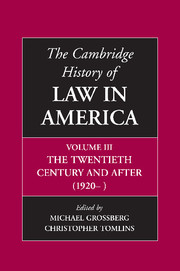Book contents
- Frontmatter
- 1 Law and the State, 1920–2000: Institutional Growth and Structural Change
- 2 Legal Theory And Legal Education, 1920–2000
- 3 The American Legal Profession, 1870–2000
- 4 The Courts, Federalism, and The Federal Constitution, 1920–2000
- 5 The Litigation Revolution
- 6 Criminal Justice in the United States
- 7 Law and Medicine
- 8 The Great Depression and the New Deal
- 9 Labor’s Welfare State: Defining Workers, Constructing Citizens
- 10 Poverty law and income Support: From the Progressive Era to the War on Welfare
- 11 The Rights Revolution in the Twentieth Century
- 12 Race and Rights
- 13 Heterosexuality as a Legal Regime
- 14 Law and the Environment
- 15 Agriculture and the State, 1789–2000
- 16 Law and Economic Change During the Short Twentieth Century
- 17 The Corporate Economy: Ideologies of Regulation and Antitrust, 1920–2000
- 18 Law and Commercial Popular Culture in the Twentieth-Century United States
- 19 Making Law, Making War, Making America
- 20 Law, Lawyers, and Empire
- Bibliographic Essays
- Notes on Contributors
- Index
- References
1 - Law and the State, 1920–2000: Institutional Growth and Structural Change
Published online by Cambridge University Press: 28 November 2008
- Frontmatter
- 1 Law and the State, 1920–2000: Institutional Growth and Structural Change
- 2 Legal Theory And Legal Education, 1920–2000
- 3 The American Legal Profession, 1870–2000
- 4 The Courts, Federalism, and The Federal Constitution, 1920–2000
- 5 The Litigation Revolution
- 6 Criminal Justice in the United States
- 7 Law and Medicine
- 8 The Great Depression and the New Deal
- 9 Labor’s Welfare State: Defining Workers, Constructing Citizens
- 10 Poverty law and income Support: From the Progressive Era to the War on Welfare
- 11 The Rights Revolution in the Twentieth Century
- 12 Race and Rights
- 13 Heterosexuality as a Legal Regime
- 14 Law and the Environment
- 15 Agriculture and the State, 1789–2000
- 16 Law and Economic Change During the Short Twentieth Century
- 17 The Corporate Economy: Ideologies of Regulation and Antitrust, 1920–2000
- 18 Law and Commercial Popular Culture in the Twentieth-Century United States
- 19 Making Law, Making War, Making America
- 20 Law, Lawyers, and Empire
- Bibliographic Essays
- Notes on Contributors
- Index
- References
Summary
Belief that the United States occupies an exceptional place in world history has been a persistent element of the American creed. The founding of the nation was a new birth of freedom, Americans have been taught; it delivered them from the class conflict and ideological strife that have plagued the rest of the modern world. Not infrequently, seekers of the ultimate source of the United States’ exceptionalism have settled on the peculiarly fragmented nature of its government. The nation was born in a revolt against the modern state. In Europe, standing armies, centralized taxation, juryless courts, and national bureaucracies loyal to a distant sovereign were the hallmarks of the proudest monarchies. To Revolutionary America, they were evidence of tyrannous intent, “submitted to a candid world.” To prevent such abominations from reappearing in the new nation, Americans shattered sovereignty into legislative, executive, and judicial fragments and embedded them in their states’ written constitutions. The Federal Constitution of 1787 went further, for it also divided sovereignty between the national government and the states. The result, as John Quincy Adams observed, was “the most complicated government on the face of the globe.”
The new nation had plenty of law and plenty of local governments ready, willing, and able to promote private economic endeavor with grants of public land and public money. What the United States lacked, however, was centralized administration, a counterpart to the royal bureaucracies of Europe capable of consistently implementing national policies. The central government had to entrust the enforcement of an order to “agents over whom it frequently has no control, and whom it cannot perpetually direct,” explained Alexis de Tocqueville.
- Type
- Chapter
- Information
- The Cambridge History of Law in America , pp. 1 - 33Publisher: Cambridge University PressPrint publication year: 2008

